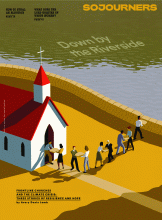IN 1985, WHEN Jesse Milan Jr. was in his late 20s, no one from his Philadelphia church attended his partner’s funeral. Not because they refused, but because Milan didn’t invite them. Doing so would have required him to say what he felt uncomfortable sharing: He loved a man who had HIV. He is a man who has HIV.
“This is never going to happen to me again,” Milan vowed to himself at the funeral, regarding the loneliness he felt because he didn’t draw close his church family at one of the most painful moments of his life.
Milan is now the president and CEO of AIDS United, an organization fighting the HIV epidemic in the U.S. He is adamant that no one in the HIV community be isolated from the love and support they need. “People living with HIV,” said Milan, “have a longing to belong. A longing to be cared for and a longing to not be silent or secret.”
A lifelong Episcopalian, Milan grew up in a congregation in the Diocese of Kansas, following the example of his mother and father in serving their spiritual home and, in times of need, allowing their siblings in Christ to serve them. Milan kept this mutuality in mind when he enrolled at Princeton University and, struggling to transition from public school and homesick for his church, joined the Episcopal Church at Princeton. It was, Milan told Sojourners, “an anchor, a port to tap into on a regular basis whenever I needed it.”
Helping communities live
FOR MANY PEOPLE today, the closest we get to understanding the impact of HIV/AIDS in the 1980s and early ’90s is through stage and screen portrayals such as Pose, Angels in America, and Rent. For others, the memories and losses of that time are vivid and unforgettable.
For instance, Jesse Peel, a gay psychiatrist and community organizer, documented in his journals the avoidance and terror of HIV that overtook his home city, Atlanta, and the nation. As many people rapidly contracted and died of the disease, doctors struggled to understand what was happening and many nurses refused to bring meals into the hospital rooms of the stricken, Peel wrote in documents he donated to a collection at Emory University. By 1994, AIDS was the leading cause of death for Americans age 25 to 44. It killed more than 350,000 people in the country between 1981 and 1995.
“I think the experience of people who are of a certain age will always be colored by our experience of the death and the dying,” said Milan. “Today, I sense that [younger] people’s commitment to HIV/AIDS work is more about the rights and the inequalities that are manifested in HIV and AIDS. They have a broad lens about where human rights need to advance, and that broad lens includes the trans community and all others.”
In the early years of the epidemic, many pastors and religious people publicly denounced and turned their backs on HIV-positive people. Others embraced those who were suffering, opening care programs and advocating for government funding. Reminding the nation’s leaders of their responsibility to the HIV community is a job that’s been done by many Christians and is a significant part of AIDS United’s history and present work.
Read the Full Article

